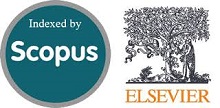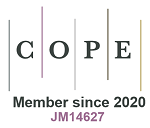Assessing the Impact of COVID-19 on Corporate Investment Behavior
Abstract
The current wave of COVID-19 outbreak has created new strategical challenges for policy officials of the industrial sector across the world. The effect of COVID-19 is more in developing economies where industrial sector is already struggling for its stability. This study introduces the impact of COVID-19 on the corporate investment behavior of non-financial publicly listed firms of Pakistan. To achieve the objective, we employ the panel data ranging from 2010 to 2020 and apply the difference-in-differences (DID) model to quantifies the empirical relationship. The outcomes of DID model suggest that the pandemic period and treatment have a significant and negative impact on corporate capital investment behavior. During pandemic spread period, the enterprises have limited their investment into fixed assets due to less productive use of such assets. Similarly, industries that exist in high-impact areas face a negative investment growth rate due to quarantine policy, fewer social movements, and high installing cost of new machinery. However, this negative effect diminishes across those firms that have a quick cash inflow rate and more availability of bank loans. These two factors serve as a financial setback against the adversities of pandemic. By drawing upon the empirical reasoning on the effect of COVID-19, this study also presents possible solutions to alienate unfavorable impacts of this pandemic. Current analysis can be considered as an early attempt towards investigating the consequences of COVID-19 on investment decisions of industrial sector.
JEL Classification: G32: G31: G40: C33
Doi: 10.28991/esj-2021-SPER-11
Full Text: PDF
Keywords
References
Ahmed, SheharYar. “Impact of COVID-19 on Performance of Pakistan Stock Exchange.” SSRN Electronic Journal (2020). doi:10.2139/ssrn.3643316.
Gu, Xin, Shan Ying, Weiqiang Zhang, and Yewei Tao. “How Do Firms Respond to COVID-19? First Evidence from Suzhou, China.” Emerging Markets Finance and Trade 56, no. 10 (July 25, 2020): 2181–2197. doi:10.1080/1540496x.2020.1789455.
Ozkan, Oktay. “Impact of COVID-19 on Stock Market Efficiency: Evidence from Developed Countries.” Research in International Business and Finance 58 (December 2021): 101445. doi:10.1016/j.ribaf.2021.101445.
Shen, Huayu, Mengyao Fu, Hongyu Pan, Zhongfu Yu, and Yongquan Chen. “The Impact of the COVID-19 Pandemic on Firm Performance.” Emerging Markets Finance and Trade 56, no. 10 (July 25, 2020): 2213–2230. doi:10.1080/1540496x.2020.1785863.
Hong, Hui, Zhicun Bian, and Chien-Chiang Lee. “COVID-19 and Instability of Stock Market Performance: Evidence from the U.S.” Financial Innovation 7, no. 1 (February 24, 2021). doi:10.1186/s40854-021-00229-1.
Grazzi, Marco, Nadia Jacoby, and Tania Treibich. “Dynamics of Investment and Firm Performance: Comparative Evidence from Manufacturing Industries.” Empirical Economics 51, no. 1 (August 2, 2015): 125–179. doi:10.1007/s00181-015-0991-2.
Farooq, Umar, Jaleel Ahmed, and Shamshair Khan. "Do the macroeconomic factors influence the firm's investment decisions? A generalized method of moments (GMM) approach." International Journal of Finance & Economics 26, no. 1 (2021): 790-801.doi: 10.1002/ijfe.1820.
Anderson, Ronald C., Augustine Duru, and David M. Reeb. “Investment Policy in Family Controlled Firms.” Journal of Banking & Finance 36, no. 6 (June 2012): 1744–1758. doi:10.1016/j.jbankfin.2012.01.018.
Brav, Alon, Wei Jiang, Song Ma, and Xuan Tian. “How Does Hedge Fund Activism Reshape Corporate Innovation?” Journal of Financial Economics 130, no. 2 (November 2018): 237–264. doi:10.1016/j.jfineco.2018.06.012.
Ratten, Vanessa. “Coronavirus (covid-19) and Entrepreneurship: Changing Life and Work Landscape.” Journal of Small Business & Entrepreneurship 32, no. 5 (July 21, 2020): 503–516. doi:10.1080/08276331.2020.1790167.
Sharma, Smriti, and Finn Tarp. “Does Managerial Personality Matter? Evidence from Firms in Vietnam.” Journal of Economic Behavior & Organization 150 (June 2018): 432–445. doi:10.1016/j.jebo.2018.02.003.
Sharpe, William F. “Capital Asset Prices: A Theory Of Market Equilibrium Under Conditions Of Risk” The Journal of Finance 19, no. 3 (September 1964): 425–442. doi:10.1111/j.1540-6261.1964.tb02865.x.
Shafi, Mohsin, Junrong Liu, and Wenju Ren. “Impact of COVID-19 Pandemic on Micro, Small, and Medium-Sized Enterprises Operating in Pakistan.” Research in Globalization 2 (December 2020): 100018. doi:10.1016/j.resglo.2020.100018.
Waheed, Rida, Suleman Sarwar, Sahar Sarwar, and Muhammad Kaleem Khan. “The Impact of COVID ‐19 on Karachi Stock Exchange: Quantile‐on‐quantile Approach Using Secondary and Predicted Data.” Journal of Public Affairs (August 6, 2020). doi:10.1002/pa.2290.
Ajide, Folorunsho M. “Firm-Specific, and Institutional Determinants of Corporate Investments in Nigeria.” Future Business Journal 3, no. 2 (December 2017): 107–118. doi:10.1016/j.fbj.2017.05.002.
Pigou, Arthur C. "Mr. JM Keynes' General theory of employment, interest and money." Economica 3, no. 10 (1936): 115-132. doi:10.2307/2549064.
Clark, J. Maurice. “Business Acceleration and the Law of Demand: A Technical Factor in Economic Cycles.” Journal of Political Economy 25, no. 3 (March 1917): 217–235. doi:10.1086/252958.
Shapiro, Matthew D., Olivier J. Blanchard, and Michael C. Lovell. “Investment, Output, and the Cost of Capital.” Brookings Papers on Economic Activity 1986, no. 1 (1986): 111. doi:10.2307/2534415.
Duesenberry, James C. Income, saving, and the theory of consumer behavior. Vol. 87. Cambridge: Harvard economic studies 1949.
Tobin, James. “A General Equilibrium Approach To Monetary Theory.” Journal of Money, Credit and Banking 1, no. 1 (February 1969): 15. doi:10.2307/1991374.
Lewellen, Jonathan, and Katharina Lewellen. “Investment and Cash Flow: New Evidence.” Journal of Financial and Quantitative Analysis 51, no. 4 (August 2016): 1135–1164. doi:10.1017/s002210901600065x.
Kusumahadi, Teresia Angelia, and Fikri C Permana. “Impact of COVID-19 on Global Stock Market Volatility.” Journal of Economic Integration 36, no. 1 (March 15, 2021): 20–45. doi:10.11130/jei.2021.36.1.20.
Umutlu, Mehmet. “Firm Leverage and Investment Decisions in an Emerging Market.” Quality & Quantity 44, no. 5 (May 7, 2009): 1005–1013. doi:10.1007/s11135-009-9250-y.
Vo, Xuan Vinh. “Leverage and Corporate Investment – Evidence from Vietnam.” Finance Research Letters 28 (March 2019): 1–5. doi:10.1016/j.frl.2018.03.005.
Griffin, Dale, Kai Li, and Ting Xu. “Board Gender Diversity and Corporate Innovation: International Evidence.” Journal of Financial and Quantitative Analysis 56, no. 1 (February 28, 2020): 123–154. doi:10.1017/s002210901900098x.
Fu, Mengyao, and Huayu Shen. “COVID-19 and Corporate Performance in the Energy Industry.” Energy RESEARCH LETTERS (May 30, 2020). doi:10.46557/001c.12967.
Himanshu, Ritika, Nikhat Mushir, and Ratan Suryavanshi. “Impact of COVID-19 on Portfolio Allocation Decisions of Individual Investors.” Journal of Public Affairs (February 18, 2021). doi:10.1002/pa.2649.
Talwar, Manish, Shalini Talwar, Puneet Kaur, Naliniprava Tripathy, and Amandeep Dhir. “Has Financial Attitude Impacted the Trading Activity of Retail Investors During the COVID-19 Pandemic?” Journal of Retailing and Consumer Services 58 (January 2021): 102341. doi:10.1016/j.jretconser.2020.102341.
Farooq, Umar, Jaleel Ahmed, Mosab I. Tabash, Suhaib Anagreh, and Bilal Haider Subhani. “Nexus Between Government Green Environmental Concerns and Corporate Real Investment: Empirical Evidence from Selected Asian Economies.” Journal of Cleaner Production 314 (September 2021): 128089. doi:10.1016/j.jclepro.2021.128089.
DOI: 10.28991/esj-2021-SPER-11
Refbacks
- There are currently no refbacks.
Copyright (c) 2021 Umar Farooq






